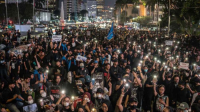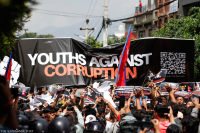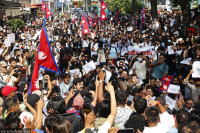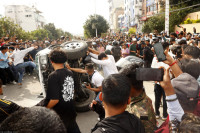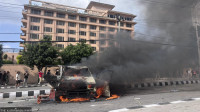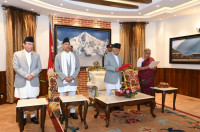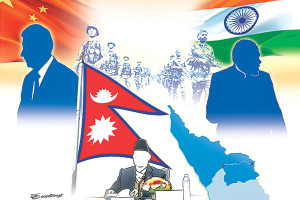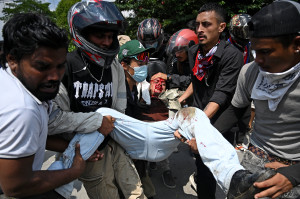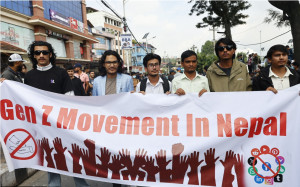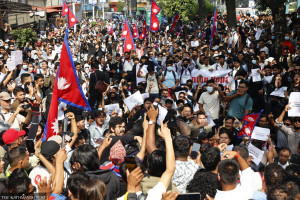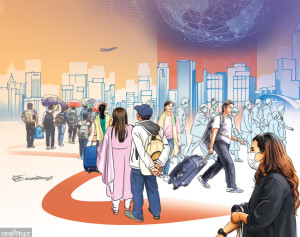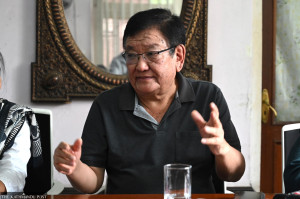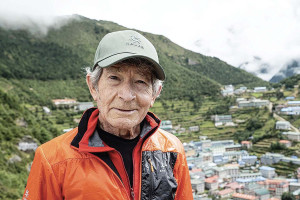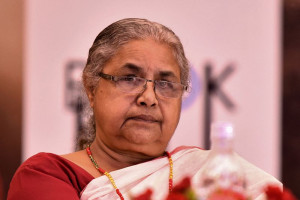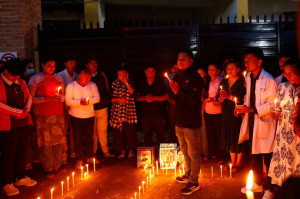Columns
Three men in a rocky boat
Nepal’s top political leaders feel entitled, just like a certain Begum chased out of her country.
Biswas Baral
Having chugged down his few customary pegs of Royal Salute, Prachanda had that night gone to bed rather early, safe in the knowledge that he had, once again, averted a catastrophe. Earlier in the day, the Maoist chief had sat down for a long chat with KP Sharma Oli, the leader of the CPN-UML, the biggest partner in the ruling coalition.
Prachanda was sure he had ‘convinced’ his fellow comrade to continue supporting the Maoist Centre-led government. If there were any doubts left in the prime minister’s mind, Oli had deftly deflected them with a heart-tugging assurance: “If we live, we will live together, and if we die, we will also die together.”
So Prachanda could hardly believe his ears when Barsha Man Pun, his confidant and finance minister, rang him up near midnight to inform Oli had switched his allegiance and was now teaming up with Sher Bahadur Deuba to fashion a new government. Hadn’t Oli promised him, just hours ago, that their fates were inseparably entwined? Subtly winning people over by telling them exactly what they wanted to hear was his signature strength: How could Oli pip the old persuasion master at his own game!
No doubt, the main driver of the July 1st midnight deal was Oli’s desire to again be prime minister at the earliest. He knew Prachanda was untrustworthy and could change sides any time. Many believe Oli, all along, intended to ditch Prachanda midcourse after successfully driving a wedge in the Congress-Maoist Centre alliance just three months ago. Whatever the case, the UML top boss saw his chance and grabbed it with both hands.
There were other factors, too. For someone with Oli’s bloated ego, it was unacceptable of Prachanda—the 32-seat prime minister—to go around boasting about his ‘magic number’, when it was Oli with his 79 seats who had decided to bless the Maoist chief with another premiership. At the same time, Oli was spooked by new voices for an investigation into the Giri Bandhu tea estate scam, some of them emerging from within Prachanda’s coalition.
A new power-sharing deal with the Congress would solve all these problems in one fell swoop. Starting on June 21, the day of the Rastriya Swatantra Party’s tea party, Oli had already started searching for the right mediator to talk to Deuba.
But why such secrecy around the agreement? Oli, in particular, insisted on watertight confidentiality, so much so that even Bishnu Paudel, a long-time Oli acolyte, was kept in the dark. Senior UML and Maoist Centre leaders kept rubbishing any prospect of a Congress-UML tie-up, even up until 11:30 pm, just half an hour before the agreement was inked.
Oli feared that if word got of his coming back to power in Kathmandu, a certain neighbour he had been constantly needling over the past few years would throw cold water over his prime ministerial ambitions. Thus came into being one of the most secretive deals in Nepali political history.
The midnight miracle’s rationale was slightly different for Deuba. He knew that whatever an eventual agreement stipulated, Oli was more than capable of reneging on his promise. (Currently, the deal is for the UML chief to serve for the first two years, after which Deuba will lead an electoral government.)
But Deuba and his wife Arzu Rana seemed to have run out of options when Prachanda negotiated the return from India of Bechan Jha, a middleman involved in the scam to send fake Bhutanese refugees to the US. Apparently, had Jha spilled the beans, senior Congress leaders, including Rana, could have been implicated in the scam.
Deuba had the added incentive of avenging Prachanda’s betrayal, just three months ago, of ditching him to join hands with Oli. Fate, he was assured, was on his side. A trusted guru had long ago assured the superstitious Congress leader of at least seven stints as prime minister. Having already served on five occasions, time was running out to capitalise on his good fortune. So, despite Oli’s fickleness, Deuba decided to take his chances.
In the Congress, even the party’s two general secretaries didn’t have a clue about the impending agreement, as one of them, Gagan Thapa, later admitted.
All this brings us back to the degree of control the leaders of the two largest parties in the country enjoy, not just over their parties but the country’s government apparatus as a whole. They can do pretty much as they like and couldn’t care less about the message this sends about their democratic credentials and, by extension, about the health of Nepali democracy.
Despite all the ‘progressive’ changes following the 2006 April Revolution, Nepali politics is still centred on two men—three if we factor in Prachanda as the third major power broker in town.
The same could be said about the functioning of the Congress, the UML and the Maoist Centre. Overlook for a bit the veneer of change represented by, for instance, having more elected posts, and these three entitled men continue to maintain an absolute grip on their parties.
Even with two elected general secretaries in the house, Deuba runs the Congress as his fief. Oli, as prime minister, continues to lecture the UML rank and file on the dangers of having too much internal democracy. Despite random protestations against his leadership, Prachanda has been the uncontested one-man show in the Maoist Centre for three and a half decades.
One of the pretexts of the July 1st two-party agreement is the need for urgent constitutional changes, most notably to limit the powers of smaller parties and reduce the number of proportional representation seats. They could be playing with fire. As many analysts have pointed out, many groups and communities are dissatisfied with the new constitution and if amendments are made for the benefit of certain groups—read: old elites—the others whose rights and benefits are cut will revolt.
The political big bosses in Nepal would have seen how, in next-door Bangladesh, a proposal to increase the quota for Sheikh Hasina’s cronies in government jobs cost Hasina more than her job. The irate mob literally chased her out of the country.
The comparisons with Bangladesh are inexact.
Nepali elected leaders are perhaps better articulators of people’s aspirations than their Bangladeshi counterparts—maybe because unlike in Bangladesh they are elected in free and fair elections. The Nepali public sphere is more vibrant and its press freer. There is more room for peaceful venting of public frustration in Nepal than in anywhere else in South Asia.
But there is also a big similarity with Bangladesh. The two Bengali begums—and the military rulers before them—treated their country as personal property and rode roughshod over democratic norms and values. This same sense of entitlement could eventually doom Nepal’s own entitled leaders.
Editor’s note: The online version of this article has been slightly edited for clarity




 22.12°C Kathmandu
22.12°C Kathmandu
